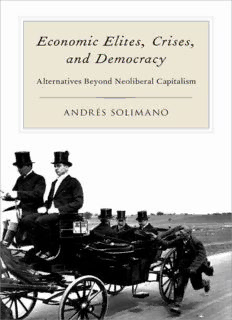
Economic elites, crises, and democracy : alternatives beyond neoliberal capitalism PDF
Preview Economic elites, crises, and democracy : alternatives beyond neoliberal capitalism
Economic Elites, Crises, and Democracy Economic Elites, Crises, and Democracy Alternatives beyond Neoliberal Capitalism z ANDRÉS SOLIMANO 1 3 Oxford University Press is a department of the University of Oxford. It furthers the University’s objective of excellence in research, scholarship, and education by publishing worldwide. Oxford New York Auckland Cape Town Dar es Salaam Hong Kong Karachi Kuala Lumpur Madrid Melbourne Mexico City Nairobi New Delhi Shanghai Taipei Toronto With offices in Argentina Austria Brazil Chile Czech Republic France Greece Guatemala Hungary Italy Japan Poland Portugal Singapore South Korea Switzerland Thailand Turkey Ukraine Vietnam Oxford is a registered trademark of Oxford University Press in the UK and certain other countries. Published in the United States of America by Oxford University Press 198 Madison Avenue, New York, NY 10016 © Oxford University Press 2014 All rights reserved. No part of this publication may be reproduced, stored in a retrieval system, or transmitted, in any form or by any means, without the prior permission in writing of Oxford University Press, or as expressly permitted by law, by license, or under terms agreed with the appropriate reproduction rights organization. Inquiries concerning reproduction outside the scope of the above should be sent to the Rights Department, Oxford University Press, at the address above. You must not circulate this work in any other form and you must impose this same condition on any acquirer. Library of Congress Cataloging-in-Publication Data Solimano, Andrés. Economic elites, crises, and democracy : alternatives beyond neoliberal capitalism / Andrés Solimano. pages cm Includes bibliographical references and index. ISBN 978–0–19–935598–3 (alk. paper) 1. Elite (Social sciences)—History—21st century. 2. Rich people—History—21st century. 3. Financial crises—History—21st century. 4. Neoliberalism—History—21st century. 5. Capitalism—History—21st century. I. Title. HN460.E4S65 2014 305.5′2—dc23 2014006781 1 3 5 7 9 8 6 4 2 Printed in the United States of America on acid-free paper Contents Acknowledgments vii 1. Introduction and Guide to the Book 1 PART ONE: Elites, Entrepreneurs, and the Middle Class: The Top 1 Percent and the Rest 2. Economic Elites and the Super-Rich in the Twenty-First Century 25 3. Productive Elites? On Entrepreneurship, the Technostructure, and the Corporation 55 4. The Fragmentation of the Middle Class in the Neoliberal Era 68 PART TWO: Economic Crisis and the Instability of Financial Capitalism 5. Stories of Financial Crisis and Austerity from the Nineteenth to the Twenty-first Centuries 85 6. Making Sense of Crises in Capitalism: An Overview of Theories and Approaches 110 PART THREE: Elites, Diaspora Migration and Social Movements in Global Capitalism 7. The International Circulation of Elites and Global Social Movements 131 vi Contents 8. Migrant Diasporas, Development, and the Attachment to National Identity 142 PART FOUR: Economic Democracy and the 99 Percent 9. Can Capitalism Afford Economic Democracy? 161 10. Epilogue: Deconstructing Neoliberal Capitalism 181 References 191 Index 203 Acknowledgments I am grateful to the Entrepreneurship and Business School of Universidad Mayor in Santiago, Chile, for providing a congenial environment for me to complete this book. I would like to thank also my colleagues and good friends Juan Pablo Jimenez from UN-ECLAC for joint work on economic elites and taxation that led eventually to chapter 2 of this book; and Federica Chiocchetti with whom I started, some years ago, the exploratory work on economic democracy that served as the basis for chapter 9. I want also to acknowledge the unfailing support and encouragement of Scott Parris, now at Oxford University Press, in writing this book. Appreciation goes also to Cathryn Vaulman from OUP for her continued help in the publication pro- cess and to Angelica Sepulveda from Universidad Mayor, who provided very effective assistance in the final stages of putting together the manuscript. Last, but not least, my gratitude goes to my wife Bernardita, daughters Gracia and Paula, and son Pedro for their patience and support while I was writing this book. 1 Introduction and Guide to the Book Since the 1980s and 1990s we have been living in a variant of capital- ism—dominant in the United States, the United Kingdom, Chile, South Africa, Russia, and to an extent in China, and a score of other countries—that embraces policies of privatization, market deregulation, globalization, dena- tionalization, and financialization as the engines for growth and moderniza- tion. This variety of capitalism, often called neoliberalism, shows the following main features: (i) prevalence of monopolistic markets dominated by oligopo- lies and big conglomerates in key economic activities; (ii) legitimization of the profit motive over other motivations, such as solidarity and altruism, as the fundamental mechanism to coordinate human activities and encourage wealth creation and distribution; (iii) reduced role for the state in the economy as pro- ducer, regulator, and redistributive agent; (iv) significant concentration of eco- nomic power and political influence in small but powerful economic elites—in other words, a strong dominance of capital; (v) a high frequency of financial cri- ses; (vi) weakening of the influence of labor unions and decline of labor shares in the national income; (vii) control of the mass media and other mechanisms of knowledge production, and dissemination by private interests and economic conglomerates; and (viii) low-intensity democratic processes with reduced citi- zen participation, and strongly influenced by big money and interest groups. The adoption of neoliberal policies has been accompanied, in the eco- nomic and social realms, by pronounced growth cycles, financial instability, large inequality of income and wealth, sharp internal differentiation of the middle class generally considered as a stabilizing segment in society, fragmen- tation of entrepreneurship, the globalization of elites, and a rise in the migra- tion of highly segmented global labor markets along with the surge of global and national social movements critical of inequality, power abuses and the lack of effective and transparent democracy.
Description: